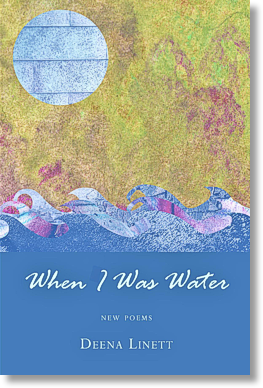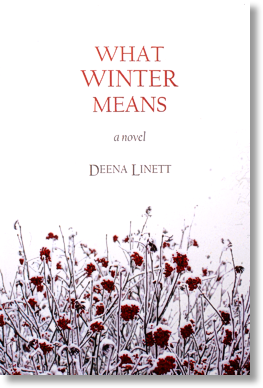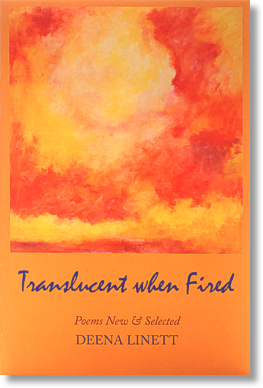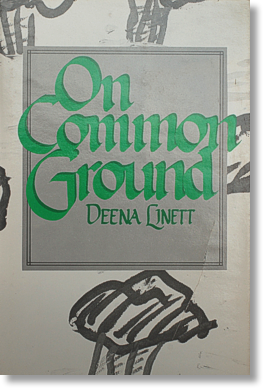Deena Linett


Deena’s fifth poetry collection, When I Was Water is available now from Tiger Bark Press.
When I was Water is wonderful -- literally, full of wonders, generated by the combined force of keen observation and winged imagination. -- Alicia Ostriker
Read a selected poem from When I Was Water below.
Her fourth novel, The Men in My Life: A Novel, appeared in early 2020. You can order it
through Unsolicited Press, and Amazon.
Deena’s fourth novel adds to two books published in 2017, a prize-winning third novel and a New & Selected poetry collection composed of seventy pages of new poems and selections from three previous collections.
Translucent When Fired: Poems New and Selected is available from Tiger Bark Press and from Amazon.
Linett’s third novel, What Winter Means, took the Evening Street Press Grassic Short Novel Prize, and follows five very different women making radical changes in their lives as they deal with their work, their men and their children. Available from Evening Street and Amazon.
About
Fellowships to Hawthornden Castle, Scotland, led to her first two volumes of poetry, Rare Earths, composed primarily of fictive letters in the voices of Scottish island women over 250 years, and Woman Crossing a Field, in which many of the poems respond to her work in Belfast, and explorations in the Orkneys and the Western Isles of Scotland. The third poetry collection, The Gate at Visby, grew from her experiences at The Baltic Centre for Writers and Translators on Gotland, an island in the Baltic Sea off Sweden.
While earning her doctorate at Rutgers University, Linett had the first of two fellowships to Yaddo, where she completed her first novel, On Common Ground, co-winner of the Associated Writing Programs Award Series in the novel. The second Yaddo fellowship led to the second prize-winning novel, The Translator’s Wife.
Born in Boston, Linett grew up on the Gulf coast of Florida. She lived for many years in northern New Jersey (where from her windows she could see New York, and the smoke when the Towers fell), and taught at Montclair State University. She lives now in South Florida.
Poems & Prose
From Generation to Generation
Across the three thousand miles
from ocean to ocean, over fields
and stone and forests, rifts and rivers,
the great caldera and the mountains
of the North American plate,
its slickrock and deserts, its dry
beds and streams, high cirques,
its vaulted walls of sandstone
and granite streaked and layered,
like a plucked string on a violin
sound made of feeling travels
through clear air, leaves no mark
and comes to the old one
whose heartbeat answers to the tone.
from When I Was Water
The Natural Element
You have no choice. This is as natural as breathing.
You let down into it or are drawn. Like heartbeat
it does not care what you think. Generated
in the salty marrow of your bones, radiant
with chemistry and synapse, old as seas, desire
wells up out of mystery and all proportion,
impersonal as history but sweeter, and close
as your own smells. It surges, swells
to take the shape of its container and spilling,
offers no apologies. It is not here for you
but uses you as it moves through, like music,
as insubstantial, as absolutely real.
Clay Figures
Now we know the people who made us
were merely children, afraid
we would find out how little
they were sure of, and like children
grown bored with their toys,
they have gone. We are the charms
they turned from and forgot.
If there were words to keep them
they've been lost. The wind picks up.
Hills and trees that slowed it are removed.
This is what we've always known:
they'd go out after dinner and not come home,
leaving us alone like small clay dolls
on the vast plain of the world. Now the draft
before the wide dismissive sweep
that one day will wipe us all away
the way a child's hand clears off a tabletop.
From “Erotics of Place,” an essay, The Georgia Review:
Crossing the little strait between Gotland and Fårö,
light's insubstantial coruscations moving
on the deep blue, I understood I was in the presence
of something that in some sense told me who I am,
and at the same time changed me.
Great gifts do not sit around like house-cats in pools of sunlight.
Nor do they repeat. It's many years since I first climbed hills
in Scotland, struggled, gasping, through deep glens, strode fields
ablaze with poppies, prickly wildflowers and stinging nettles,
hauled myself through long slick grasses across steep fields tilted and angled
and studded with pink and white and blue and yellow blooms in sunlight.
Glory, here on Earth.
(Which is handy, as I don't believe in an afterlife.)
On Orkney I climbed the Brough of Birsay, a tidal island
so steep the path to the top is cut along a wall of earth
which climbers need to lean against for balance in the wind.
We lay down at the edge so we wouldn't be blown into the sea
by winds that scour trees to scrub, and watched currents
pouring down from the Pole tossing spume and foam
against the rocks, the ocean purple and blue with yellow lights,
bright green around the islands. Leaving, we crossed a channel
strewn with house-sized slabs of fractured heaved pink stone
mindful of the tides: when the sea comes in, everything goes under the sea.
Selected Readings
- Purdue University
- Book groups in New York, New Jersey, and Indiana, by invitation
- Cornelia Street Café, New York
- Cliff Dwellers, with Aimée Picard, Chicago
- Montclair State` University
- Pittsburg State University, Kansas, Distinguished Writers Series
- Harvard University
Reviews
...poems with the small, relentless power of nature...
Donald O. Platt
“What I treasure is the way that her poems can turn with a panther-like predatory quickness from the beautiful to the terrible, all within the bounds of her skillfully deployed iambic line.” — on Translucent When Fired: Poems New and Selected
George Messo, PN Review, United Kingdom
Deena Linett’s best work gives generously and rewards repeated close readings. It is rich and complex in ways that are seldom obvious. And that in itself is a testament to her craft, to [her] unhurried precision... Linett’s prosody has the alchemical properties so necessary to her vision, animating the insensate: ...substance is the living flesh, physical and spritual, of experience, memory and transcendence.
From 100 Great American Novels You’ve (Probably) Never Read, Karl Bridges
“Linett’s daring approach... abandon[s] the linear flow of time... Linett’s talent for dialogue and eye for description make her literary technique work in an effective and dramatic matter [sic]. ...In quantum physics, one principle is that in any given moment, multiple possibilities exist. It is only when the actual observation of events is made that these multiple opportunities, or waves of possible futures, collapse into a fixed and immutable present. In The Translator’s Wife Linett expresses this idea in a compelling and innovative novel.”
Lisa Rae Cunningham, from Amazon.com
Of The Gate at Visby: Linett... is utterly aware of our common humanity, and a masterful storyteller of the gorgeous, brutal truth. This collection of poems illustrates the pitches of human nature across a universe vast beyond our reckoning. Linett intuits this depth and distance to create brilliance... At once a work of art and a time capsule, The Gate at Visbydeliverse science, history and personal discovery with the intricacy and magic of music.
Molly Peacock
“The poems travel throughout eras and lands, from Paris to Sarajevo, Edinburgh to Dublin, Half Moon Bay to the Everglades, and they traverse territory from the mythological to the hard facts of history. Her geographical coordinates anchor the shifting mental and emotional states that are the underlying subjects of her lyrical meditations.... These subtle poems ‘let light through’ -- dazzling her readers in the process.” — on Translucent When Fired: Poems New and Selected
Alicia Ostriker
“[T]he poet’s exquisite human grace and artistic purity successfully fuse the physical, the metaphysical, the intellectual, and the erotic landscapes — and skyscapes — of experience. Deena Linett is writing poetry like stained glass. The light of ’everything that happens, grain by grain,’ shines through it.” — on Woman Crossing a Field
K. C. Frederick, on Amazon.com
[The Gate at Visby] is a terrific collection of poems, exhibiting great range and building... to an impressive vision. These poems convey a hunger to know, to see, to experience everything, past, present, & future, there’s a constant reach that’s jolting and exhilarating, so that in the end the reader has been momentarily loosed from the grip of gravity and taken to a place where it’s possible to glimpse the arc of life, the connectedness of everything.
Simon Spelling on Amazon.com
Prize-winning novelist Deena Linett’s collection of poems “Rare Earths” has made me fall in love with poetry all over again. Deliberate and delicate, Linett’s ambitious work weaves a precise and unique spell on even the casual poetry reader by creating a mysterious universe haunted by the ghosts of women, and the result is a book of poetry that can be read as a novel or as a collection of icy verse gems that sends shafts of light into the deep morass of the soul...“Rare Earths” was a semifinalist for the National Book Critics Circle Award for poetry in 2002. In a world of slam poetry and lazy words masquerading as verse, Linett’s work (call it a collection of poem, a fragmented novel or a hybrid of both) rewards the demanding reader by haunting them like the ghosts of the desolate island of St Kilda. Last word: read this immediately!










